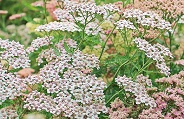Can Yarrow Be Used to Treat Epididymitis?
Date:2019-11-28 click:0
The scientific name of Yarrow is Achillea Wilsonian Heimerl ex Hand. -Mazz, which is a perennial herb of Compositae distributed in Yunnan, northwest Hunan, western Hubei, and Eastern Gansu.
Typically it grows in hillside grasslands or shrubs. It has a strong resistance to cold and loves a warm and moist environment, sunny and semi-shady areas. Soil with good drainage, rich in organic matter and lime is the best choice. The whole herb has the functions of detoxification, detumescence, hemostasis, and pain relief.

Medicinal value
Yarrow contains a variety of amino acids. The flower buds and blooming flowers contain more volatile oil, the flowers and leaves contain flavonoid glycosides, and the flowers contain water-containing threonine, betaine, choline, and fatty acids. The leaves also contain anthraquinone, which has great medicinal value. The whole herb can be used for medicinal purposes.
It can be used for trauma, rheumatic pain, amenorrhea abdominal pain, snake bite, swollen poison, and other diseases. In modern medicine, it can treat acute and chronic inflammation such as appendicitis, tonsillitis, urinary tract infection, bacillary dysentery, acute enteritis, and pelvic inflammatory disease
Epididymitis is a common disease in young and middle-aged people. When the body resistance is low, pathogenic bacteria such as Escherichia coli, Staphylococcus, Streptococcus will enter the vas deferens, retrograde invasion of the epididymis, causing inflammation. Therefore, the disease is often secondary to urethritis, prostatitis, seminal vesicle inflammation.

It is reported that the active ingredients of Aconitum rubescens in the treatment of infectious diseases are mainly contained in its acid ethanol extract and acid ethyl acetate extract. The alcohol-soluble part of 10% fresh grass was detected by plate paper method, which showed that it could inhibit Staphylococcus aureus, Streptococcus pneumoniae, Escherichia coli, and Shigella flexneri. Therefore, Yarrow has a certain therapeutic effect on epididymitis, but the proportion of herbal medicine is very strict, otherwise adverse reactions may occur.
In addition, due to epididymitis patients will also appear scrotal pain, a sense of falling, lower abdominal and inguinal pain and other symptoms, recurrent epididymitis will also cause epididymal nodules. Therefore, patients can choose Diuretic and Anti-inflammatory Pill.
The traditional Chinese herbal ingredients in the prescription not only make the use of the antidote fully reach the effect of broad-spectrum antibiotics but also effectively kill Staphylococcus and eliminate inflammation. In addition, the functions of anti-proliferation, anti-fibrosis, anti-calcification, detumescence, and dredging glands can effectively prevent the formation of epididymal nodules.

Furthermore, diet therapy can also play a very good role in the elimination of inflammation. Usually, some food such as mung beans, red adzuki beans and so on can be added to the dietary habits to clear away heat, remove dampness and detoxify, which is helpful to the recovery of epididymitis. Of course, eating more food rich in vitamins and high fibers is also conducive to enhancing immunity and eliminating inflammation. Best wishes for your recovery!
You may also be interested in:
Why Can't You Treat Epididymitis Blindly?
How to Cure Epididymitis with Traditional Chinese Medicine
Epididymitis Cured Completely By Diuretic and Anti-inflammatory Pill
You may also be interested in:
Why Can't You Treat Epididymitis Blindly?
How to Cure Epididymitis with Traditional Chinese Medicine
Epididymitis Cured Completely By Diuretic and Anti-inflammatory Pill



